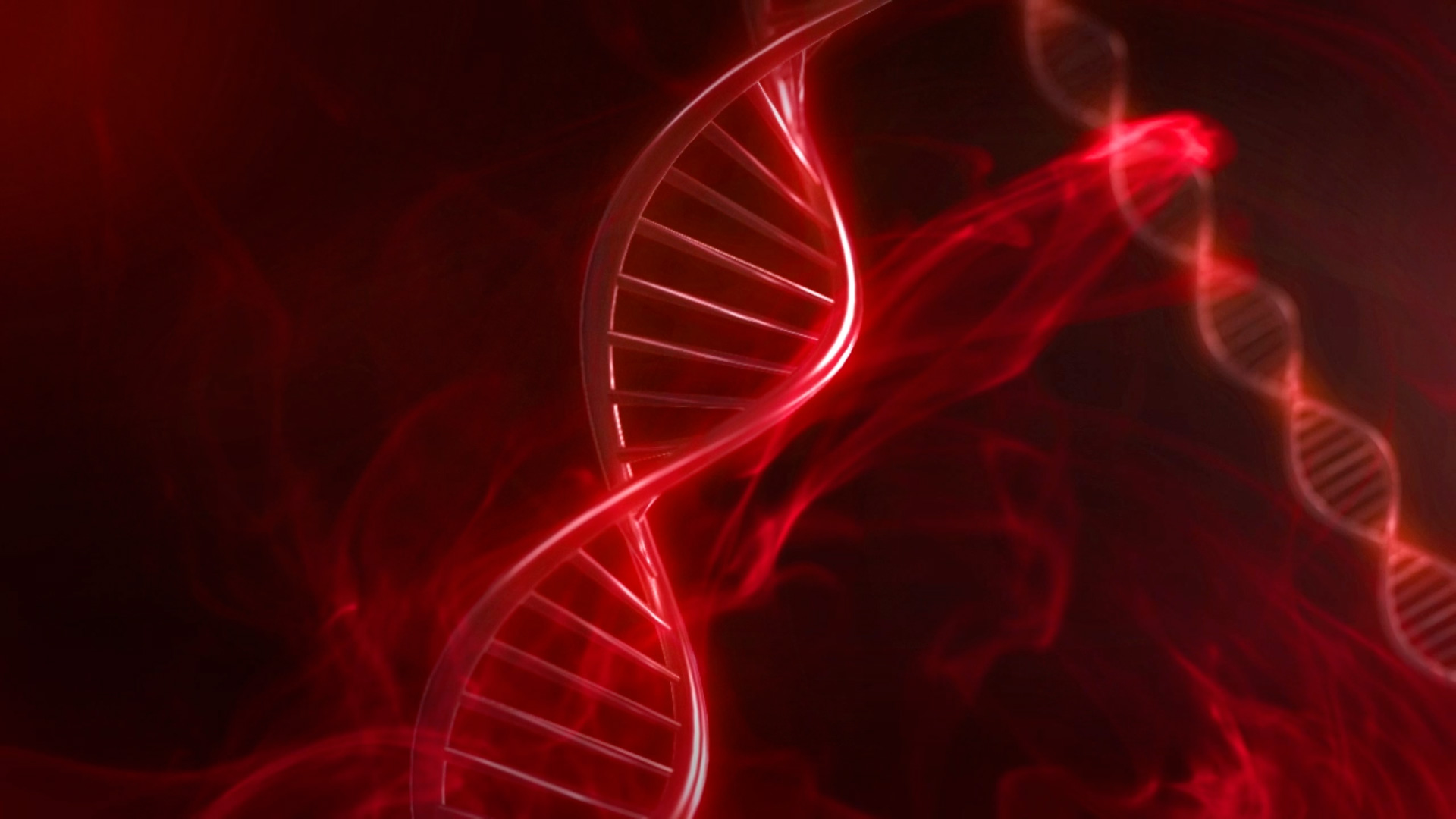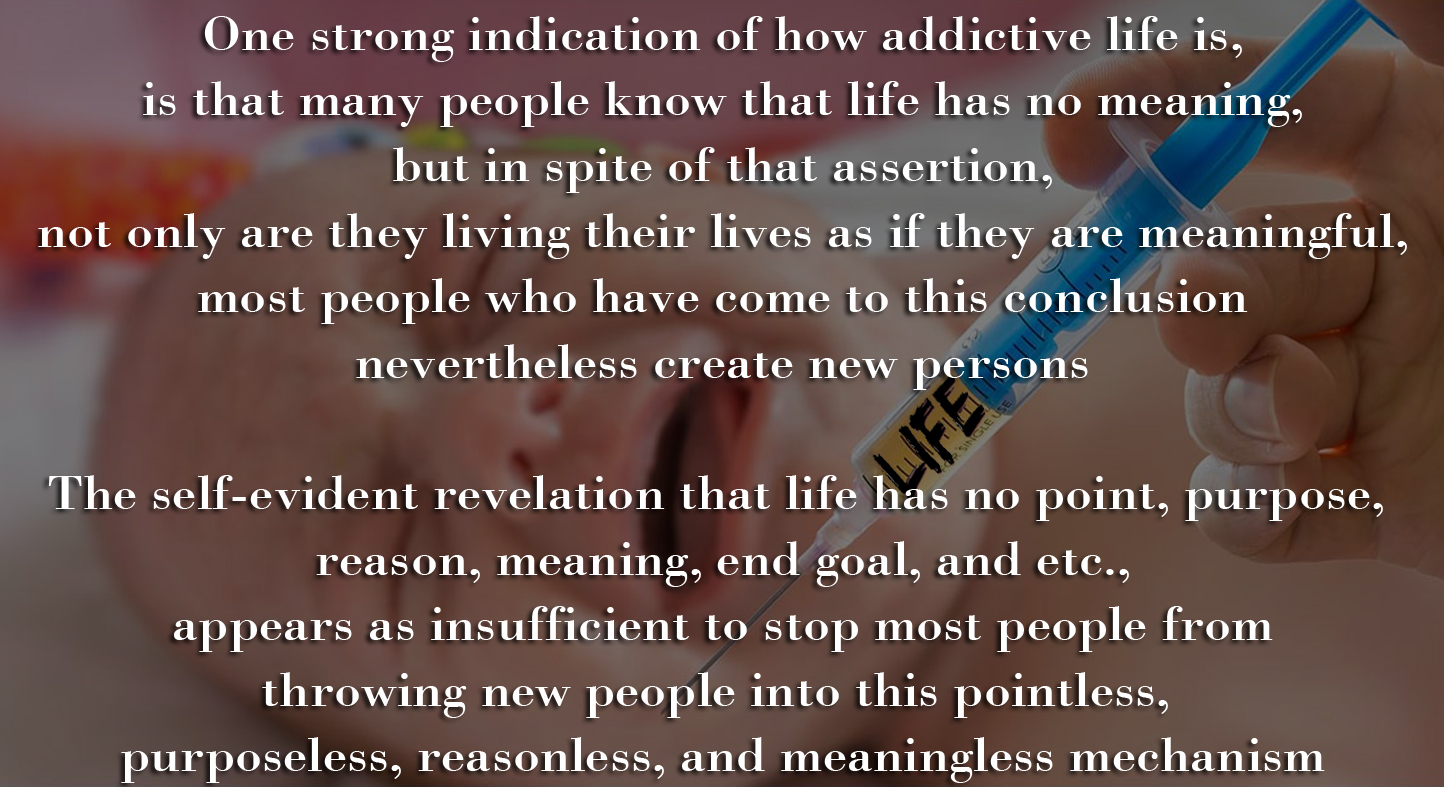
Out of all the various antinatalist arguments, the claim that parents are also victims of their own procreation, for example because pregnancy is very limitative and troublesome, because labor and childbirth is extremely painful, because breastfeeding is often also painful and usually exhausting, because of the sleepless nights, because children cost a fortune, because they demand constant attention, because they give rise to constant anxiety and etc., or even in relation to specific cases such as that something terrible happens to their children, is probably the least popular. That is since it is the parents who have decided to take the risk of creating a new person in such a dangerous world, where happiness is never guaranteed but pain always is, without getting any form of consent, and despite that the death of the person they have created is predetermined, and of course, despite that the person they have created will harm numerous others merely to support its own existence.
Obviously the parents are not the main victims of their decision to breed, and it is their responsibility and their fault, however, they are victims too. The fact that they have brought it on themselves doesn’t mean they don’t suffer from it as well. They are responsible for the harm but they are also among its victims.
I totally understand why some antinatalists resent such a claim, as it is the parents who have created the harm. The reason I nevertheless agree that parents are victims too, is only in the context of how programmed to procreate people are.
Despite how intuitive it is, we shouldn’t regard humans as if they absolutely freely and rationally choose to procreate. Humans are biological and social creatures who are physically and emotionally built to procreate, and they are living in natal societies in which the image of the family portrait is incomplete without children. Calling procreation a free rational choice is too simplistic. It is not exactly a choice, but more of a default, mostly in a biological sense, but also socially and psychologically.
In a way, everyone is a victim of circumstances, even the parents. We regard them as if they absolutely freely and rationally choose to procreate but that is not exactly accurate. They are just pawns in a game way way bigger than they are able to handle. We are misled to think they have rational justifications for their actions because they are using words that can construct coherent sentences, but actually it is mostly rationalization of their DNA programing.
People are acting, justifying, and rationalizing their decisions and behavior under the tremendous influence of various cognitive biases, among them is the existence bias – the psychological tendency to treat the mere existence of something as evidence of its goodness, and to evaluate an existing state more favorably than its alternatives.
Psychological studies that affirmed these tendencies have also found that imagining an event such as one of the possible outcomes increases the estimation of its likelihood, which in turn leads to favorable evaluation of that outcome. In other words, the better people can imagine something, the greater their estimation that it is likely to happen, and the more likely something is to happen, the more positively it is evaluated.
When it comes to existence itself, the effect of the existence bias is immeasurably stronger since not only that obviously by definition non-existence doesn’t exist, but also since the alternative option to existence is almost impossible to imagine. People can’t imagine what it is like to never exist (most mistakenly confuse never existing with ending their existence and therefore even more strongly oppose the claim that it is better never to have existed). Most people refer to questions regarding existence as if they are asked to give up their current existence (which as aforesaid they are inclined to value as good) for something they falsely imagine as eternal nothing.
For these reasons and more, the option of existence is the ultimate case of lacking any other alternative. Therefore it is not at all surprising that there is a causal relationship between existence and positive evaluation. People are biased to view existing things (and definitely existence as a whole) as good, and to view non-existence as bad.
Rational persuasion not to procreate won’t help because people don’t rationally choose to procreate.
Humans are creatures who are biologically built to breed, and psychologically built to favor existence. We need to sober people up from their existence bias and their life addiction and that is almost impossible since once someone exists s/he is already addicted. And as opposed to other addictions, it is even harder in this case to identify it as an addiction since by definition, existence is the only thing that exists, it’s all there is. When someone gets addicted to a substance or even a behavioral pattern, it can be distinguished from the person itself, we can refer to that person separately from the addiction. But when the addiction is to existence there is nothing external, there is no alternative reality to observe existence from, there is no way for someone to really examine it separately from its existence.
Not only that life’s grasp is so firm, and not only that it has some very strong psychological mechanisms on its side such as: The Pollyanna Principle, Adaptation, and Comparison with Others, all mentioned in the post regarding Benatar’s Quality of Life Argument, it is hard to imagine anything else. That is despite that it is not even required by antinatalism as people are not necessarily asked to question their own existence, but are asked not to impose on others the same harmful addiction that was imposed on them.
One example which I find quite unequivocal for that matter is that many people know that life has no meaning, but in spite of that assertion, not only are they living their lives as if they are meaningful, most people who have come to this conclusion nevertheless create new persons. The self-evident revelation that life has no point, purpose, reason, meaning, end goal, and etc., appears as insufficient to stop most people from throwing new people into this pointless, purposeless, reasonless, and meaningless mechanism. That I believe is a strong indication of just how addictive life is.
The rest of the people who breed mostly demonstrate the addictive element of life by putting their own children at such tremendous risks and convincing themselves that there is no way that something bad would ever happen to them, despite that at least one very bad thing would necessarily happen to all of them – they all would necessarily die. Maybe at the end of happy lives, maybe at the end of miserable lives, maybe at a very young age as result of an accident or a disease from which they have suffered all their lives. People know that no matter how hard they would try, how many efforts they would make, lives are shattered in seconds. It happens to so many people, and no parent can ever guarantee that it won’t happen to their children, and yet…
Facts and statistics play a very marginal role in these matters. No matter how unequivocal the data regarding the likelihood of a catastrophe is, most people won’t believe it, not to mention do something to prevent it. People tend to ignore, disfavor and discount any data that contradicts or threatens their positions, desires and behavior.
People have an existence bias and it makes them automatically approve existence and examine everything from this distorted perception. This is a very important point in relation to the idea of human extinction since it is a reason why people must never procreate as they are absolutely disqualified to examine life rationally and unbiasedly, but at the same time, it is a reason why they would never stop, as people are so biased that it is hard to see them viewing reality for what it really is.
Whether they are careless, totally irresponsible, addicted to life, or extremely existence biased, for any of these reasons, people must never breed. And for these reasons people would never stop. Most can’t do any different. I don’t think it exempts them from taking responsibility, but that it puts a lot of responsibility on our shoulders. We who care about the dire consequences of every procreation, must internalize that this madness won’t stop by logical means but by technological ones. And we must find these means.
References
Benatar David and Wasserman David, Debating Procreation: Is It Wrong to Reproduce?
(Oxford: Oxford University Press, 2015)
Benatar, D. Better Never to Have Been (Oxford: Oxford University Press, 2006)
Cabrera Julio, A Critique of Affirmative Morality: a reflection on death, birth and the value of life
(Brasília: Julio Cabrera Editions 2014)
Eidelman, S., Crandall, C. S., & Pattershall, J. (2009) The existence bias. Journal of Personality and Social Psychology, 97, 765-775
Eidelman, S., Pattershall, J., & Crandall, C. S. (2010) Longer is better.
Journal of Experimental Social Psychology, 46, 993-998
Fisk JE (2004). “Conjunction fallacy”. In Pohl RF (ed.). Cognitive Illusions: A Handbook on Fallacies and Biases in Thinking, Judgement and Memory. Hove, UK: Psychology Press. pp. 23–42. ISBN 978-1-84169-351-4. OCLC 55124398
Hardman D (2009). Judgment and decision making: psychological perspectives. Wiley-Blackwell. ISBN 978-1-4051-2398-3
Shiffrin, S.V. Wrongful life, procreative responsibility, and the significance of harm. 1999
Legal Theory 5: 117–148

Leave a Reply